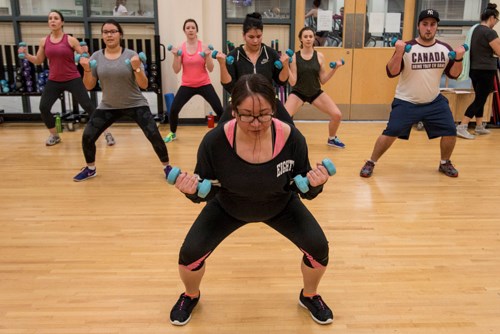Personal trainer and powwow dancer Brandyy-Lee Maxie has created POWfit- a fitness class that is “culturally-inspired” as part of her mission to help prevent diabetes in First Nation communities. Maxie grew up on White Bear First Nation and says: “It's a class suitable for everyone-both First Nations and non-First Nations people. It's fun, but it also incorporates our cultural teachings.”
           “I take various dance moves from different powwow styles and I introduce them to a fitness routine,” explains Maxie. “I use styles from the contemporary powwow and I try and choose music from First Nations artists. I'll use round dance or side-step music for certain routines. I sometimes use urban Aboriginal music, for example, music by 'A Tribe Called Red.'”
           “I introduce the fitness routine and I give a background to a group of origin stories, so it's a fitness class and an introduction to indigenous culture.”
           Maxie's POWfit classes are typically an hour long, and have both cardio routines and strength training.
           “I wanted to create something that was fun and something that would allow other people to participate in the powwow without the regalia,” she says. “My classes are for everyone, but I have a special interest in helping to reduce diabetes in First Nations communities.”
           “When I was pregnant with my youngest son,” says the 33-year-old mother of three. “I was diagnosed with gestational diabetes. It didn't go away after he was born and I was told it was Type 2 (diabetes). I asked what I could do and I was advised to lose weight... I didn't want to go to the gym, but I started working out with a lot of online videos, like Zumba, Tahitian cardio and belly dance-that are all culturally-inspired.”
           “When I lost the weight, the diabetes went away,” she says. “Diabetes is especially prevalent in First Nations people and that's why I encourage First Nations people to adopt healther lifestyles.”
           “My dad has diabetes, my sister has diabetes, I had gestational diabetes that didn't go away after the birth of my son. He's seven now, and he's been diagnosed with Type 1 diabetes.”
           “With diabetes, often the focus is on foot care, eye care and managing the disease, rather than prevention. But I'm trying to break down barriers for people in First Nations communities to help them get fit.”
           “My personal fitness journey began about seven years ago,” says Maxie. “And I'm not done my fitness journey. I'm not everyone's vision of what a fitness instructor looks like. But it's not about that. It's about health and well-being.”
           “I've struggled with an eating disorder where I struggled with body image issues and I was starving myself. And I've also gone to the other extreme, where I've used food as an emotional cushion,” she says. “Everybody has their own fitness journey. We all start somewhere and we all have our ups and downs and challenges.”
           While developing POWfit-which she is in the process of trademarking-Maxie also embarked on what she calls “an entrepreneurial journey.”
           “I come from a family of entrepeneurs and my parents (Jackie and Delmar Maxie) had the Maxie Ranch and Riding Stables, along with a petting zoo, tipi camp and the craft and gift shop there.”
           “My entrepreneurial journey is quite a journey,” says Maxie. “I couldn't find work or a home and I had to separate from my kids for a while... I did a presentation at a First Nations entrepreneurship competition and I had to make a pitch to W. Brett Wilson of CBC's Dragon's Den. It was quite nerve-wracking and exciting at the same time.”
           Maxie not only impressed Wilson, she went on to enter and win numerous other business competitions, learning more about business and networking along the way, while studying journalism at Regina's First Nations University and “getting the fitness certifications I needed.”
           Since then, her POWfit classes have been taught at the “Y” in Regina, the University of Saskatchewan in Saskatoon, and in First Nations and non-First Nations communities throughout the province.
           Even with the growing success of her venture, Maxie says she will be most gratified if POWfit can positively impact the health of people from First Nations and other communities throughout Canada.
           “My measure of success is not so much monetary, but how I can affect health statistics in my community, in Saskatchewan, or even nationally,” she says.
           “My children Valyncia (Sparvier), 12, Cassius (Maxie), 9, and Adonis (Maxie), 7, are really my driving force.”
           “My grandma's last powwow was last year in Regina. I still have the jingle dress she made me when I was 16. I put my dress away while my grandma was sick, but I danced in her honour this year.”
           “Life happens and that's really why my focus is so much on prevention and healthy living,” says Maxie.
           “Maybe I had to explore all of this with my family and loved ones so I could help people live healthier, longer lives.”Â




